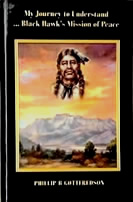Repatriation Document
1996
NAGPRA [Federal Register: January 31, 1996 (Volume 61, [(Number 21)]
[Notices]
[Page 3459-3460]
From the Federal Register
Online via GPO Access [wais.access.gpo.gov]
-----------------------------------------------------------------------
DEPARTMENT OF THE INTERIOR
National Park Service
Notice of Inventory Completion of Native American Human
Remains
and Associated Funerary Objects From Spring Lake,
Utah Under the
Control of the Uinta National Forest, United
States Forest Service and
Currently in the Possession of the
Museum of Peoples and Cultures,
Brigham Young University,
Provo, UT
AGENCY: National Park Service
ACTION: Notice
-----------------------------------------------------------------------
Notice is hereby given in accordance with the provisions of
the
Native American Graves Protection and Repatriation Act,
25 U.S.C. 3003
(d), of the completion of an inventory of
human remains and associated
funerary objects under the
control of the Uinta National Forest, United
States Forest
Service, and currently in the possession of the Museum of
Peoples and Cultures, Brigham Young University, Provo, UT.
A
detailed inventory and assessment of the human remains and
associated funerary objects was done by the U.S. Forest Service
and the
Museum of Peoples and Culture's professional staff in
consultation
with representatives of the Uintah-Ouray Ute
Tribe.
The
human remains--an adult male approximately 45-60 years old--and
a minimum of 13,558 associated objects were reportedly excavated
by
local miners in 1917 from Forest Service lands above
Spring Lake, UT.
The objects found with the remains include
brass bells, an iron spur,
approximately 13,500 multi-colored
glass seed beads, a metal axe head,
bridle rosettes, a metal
bit, and copper bracelets.
The
human remains and associated objects were accessions by the
Museum of Latter-Day Saints Church History in 1919. At that
time, a
local physician attempted to confirm a report that
the human remains
were those of the Timpanogots' Chief Black
Hawk who had died in 1870
and had been buried in the same
approximate location. The physician
collected statements from
Chana E. Hales, William E. Croft, Louise N.
Pace, and Ben H.
Bullock who had known Black Hawk. These individuals
identified many of the objects as Black Hawk's personal effects.
The
human remains and associated objects were curated by the Museum
of Latter-Day Saints Church History until 1994, when they were
transferred to the Museum of Peoples and Cultures for purposes
of
inventory and repatriation. Ontological analysis confirmed
the human
remains to be of a 45-60 year old male. Although
Black Hawk's exact age
was unknown, reports from the era
estimate his age as being in his
fifties at the time of his
death. Many of the associated objects were
identified by
representatives of the Uintah-Ouray Ute tribe as being
common
in late nineteenth century Ute burials. No evidence contradicts
the identification of the human remains as those of Black Hawk.
Mr. Richard Mountain, Ms. Arlene Appah, and Ms. Silvia
Cornpeach,
great-great grandchildren of Black Hawk's brother
Mountain, have
claimed Black Hawk's remains and funerary
objects on the basis of
lineal descent. On November 20, 1995,
the Uintah-Ouray Ute Tribal
Business Committee passed a
formal resolution recognizing their claim
and its consistency
with Ute tribal kinship practice.
Based
on the above mentioned information, officials of United
States Forest Service have determined that, pursuant to 43 CFR
10.2
(d)(1), the human remains listed above represent the
physical remains
of Black Hawk, an individual of Native
American ancestry. Museum
officials have also determined
that, pursuant to 25 U.S.C. 3001 (3)(A),
the 13,558 objects
listed above are reasonably believed to have been
placed with
or near individual human remains at the time of death or
later as part of
[[Page 3460]]
the death rite or ceremony. Lastly,
U.S. Forest Service officials have
determined that, pursuant
to 43 CFR 10.2 (b)(1), Mr. Richard Mountain,
Ms. Arlene
Appah, and Ms. Silvia Cornpeach can trace their ancestry
directly and without interruption by means of the traditional
kinship
system of the Uintah-Ouray Ute tribe to the remains
and associated
funerary objects of Black Hawk.
This
notice has been sent to Mr. Richard Mountain, Ms. Arlene
Appah, Ms. Silvia Cornpeach, and officials of the Uintah-Ouray
Ute
Tribe, the Skull Valley Executive Committee, the Southern
Ute Tribe,
the Timpanogos Mountain Ute Tribe, the Gosiute Indian
Tribe, the Paiute Tribe
of Utah, and the Kaibab Paiute Tribe
of Arizona. Any other individuals
that believe themselves to
be lineal descendants of Black Hawk should
contact Ms.
Charmaine Thompson, Heritage Program Leader, Uinta National
Forest, United States Forest Service, 88 West 100 North, Provo,
UT
84601, telephone: (801) 342-5119, before March 1, 1996.
Repatriation of
these human remains and associated funerary
objects to Mr. Richard
Mountain, Ms. Arlene Appah, Ms. Silvia
Cornpeach, may begin after that
date if no additional
claimants come forward.
Dated: January 25, 1996.
Francis P. McManamon,
Departmental Consulting Archeologist
Chief, Archeology and
Ethnography Program.
[FR Doc. 96-1827; Filed 1-30-96; 8:45
am]
BILLING CODE 4310-70-F
